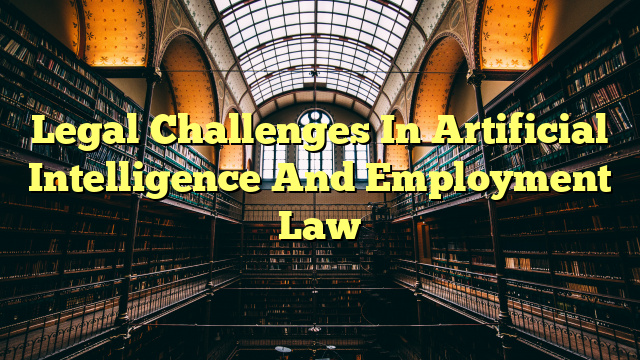Table of Contents
- Introduction
- Problems with AI in Employment Law
- Legal and Ethical Issues in Artificial Intelligence
- Legal Impact of Artificial Intelligence
- Conclusion
Introduction
Artificial Intelligence (AI) is a rapidly advancing field, and its use in the workplace is becoming increasingly common. With the emergence of AI, new legal challenges have arisen in the area of employment law. AI presents a range of issues from the perspective of both employers and employees, including discrimination, privacy, and ethical considerations. As AI continues to evolve, it is important to understand how it will impact the law.
Problems with AI in Employment Law
AI presents a range of legal challenges in the area of employment law. Two of the most prominent issues are discrimination and privacy.
Discrimination
AI has the potential to create discriminatory outcomes in the workplace. This is due to the fact that AI algorithms can be biased, as they are programmed by humans who may have implicit biases. This can lead to decisions being made on the basis of race, gender, or other protected characteristics, in violation of anti-discrimination laws.
Privacy
AI also poses a risk to employee privacy. AI algorithms can collect vast amounts of data on employees, such as their online behavior or personal information. This data can be used to make decisions about hiring, promotion, and other employment matters. However, this data can also be used to invade employees’ privacy, which could potentially lead to legal action.
Legal and Ethical Issues in Artificial Intelligence
AI raises a number of ethical considerations, particularly in the area of employment law. AI algorithms can make decisions that are not transparent, and it can be difficult to determine why a particular decision was made. This lack of transparency can lead to unfair outcomes, as employees may not be able to challenge decisions made by AI.
In addition, AI algorithms can be difficult to audit, as they can contain complex code that is difficult to understand. This can lead to ethical issues, as it can be difficult to assess the morality of decisions made by AI algorithms.
Legal Impact of Artificial Intelligence
The legal implications of AI are still unfolding. As AI continues to evolve, it will have an increasing impact on employment law, as employers will be increasingly reliant on AI algorithms to make decisions about hiring, promotion, and other matters.
To address the potential legal and ethical issues presented by AI, employers should consider implementing policies that are designed to protect employee privacy and ensure non-discriminatory outcomes. Employers should also consider implementing audit processes to ensure that AI algorithms are not making decisions on the basis of bias or other protected characteristics.
Conclusion
AI presents a range of legal challenges in the area of employment law. These include discrimination, privacy, and ethical considerations. To address these issues, employers should take steps to ensure that AI algorithms are not making decisions on the basis of bias or other protected characteristics, and that employee privacy is being respected. As AI continues to evolve, it is important to understand how it will impact the law.
What are the problems with AI in employment law? The problems with AI in employment law include discrimination, privacy, and ethical considerations.
What are the legal and ethical issues in artificial intelligence? The legal and ethical issues in artificial intelligence include a lack of transparency in decision-making, difficulty in auditing AI algorithms, and the potential for AI algorithms to make decisions on the basis of bias or other protected characteristics.
What is the legal impact of artificial intelligence? The legal impact of artificial intelligence is still unfolding, but it is likely to have an


Artificial Intelligence presents new challenges to current employment laws. It’s important to closely monitor this developing field.